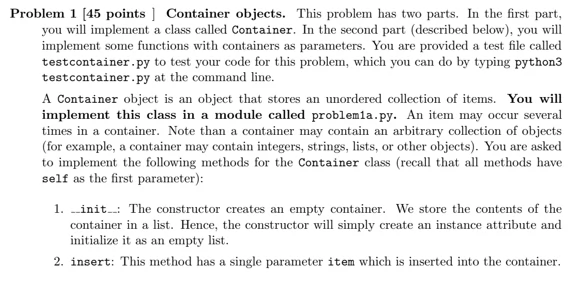Instructions
Objective
Write a python assignment to implement container objects.
Requirements and Specifications

Source Code
class Container:
def __init__(self):
"""
Create an empty container
"""
self.__items = list()
def insert(self, item):
"""
Append an element at the end of the container
"""
self.__items.append(item)
def erase_one(self, item):
"""
Delete the first occurrence of the item
"""
if item in self.__items:
self.__items.remove(item)
def erase_all(self, item):
"""
Delete all occurrence of the item in the list
"""
while item in self.__items:
self.__items.remove(item)
def count(self, item):
"""
Count the occurrence of item in the list
"""
occurrence = 0
for some_item in self.__items:
if some_item == item:
occurrence += 1
return occurrence
def items(self):
"""
Return distinct items in the list
"""
distinct_items = list()
for item in self.__items:
if item not in distinct_items:
distinct_items.append(item)
return distinct_items
def __str__(self):
"""
Return a string representation of the container
"""
return str(self.__items)[1:-1]
def __repr__(self):
"""
Returns a printable representation of the container
"""
return str(self.__items)[1:-1]
def __getitem__(self, idx):
"""
Access an item from the list given the index
"""
return self.__items[idx]
def __add__(self, other_container):
"""
Return a new container that contains all the items
that is here and the other container
"""
new_container = Container()
new_container.__items = self.__items + other_container.__items
return new_container
def __sub__(self, other_container):
"""
Return a new container where items here does not exist
on the other container
"""
paired_indices = list()
for i in range(len(other_container.__items)):
paired_indices.append(False)
new_container = Container()
for i in range(len(self.__items)):
pair_found = False
for j in range(len(other_container.__items)):
if self.__items[i] == other_container.__items[j] and not paired_indices[j]:
pair_found = True
paired_indices[j] = True
break
if not pair_found:
new_container.__items.append(self.__items[i])
return new_container
def __mul__(self, other_container):
"""
Find the intersection of two containers
"""
paired_indices = list()
for i in range(len(other_container.__items)):
paired_indices.append(False)
new_container = Container()
for i in range(len(self.__items)):
pair_found = False
for j in range(len(other_container.__items)):
if self.__items[i] == other_container[j] and not paired_indices[j]:
pair_found = True
paired_indices[j] = True
break
if pair_found:
new_container.__items.append(self.__items[i])
return new_container
Related Samples
Explore our comprehensive Python programming homework samples at ProgrammingHomeworkHelp.com. Our curated examples cover a wide array of Python concepts and applications, providing clarity and guidance for your assignments. Whether you're delving into data analysis, web development, or machine learning, our samples are designed to assist you in mastering Python programming effectively.
Python
Python
Python
Python
Python
Python
Python
Python
Python
Python
Python
Python
Python
Python
Python
Python
Python
Python
Python
Python